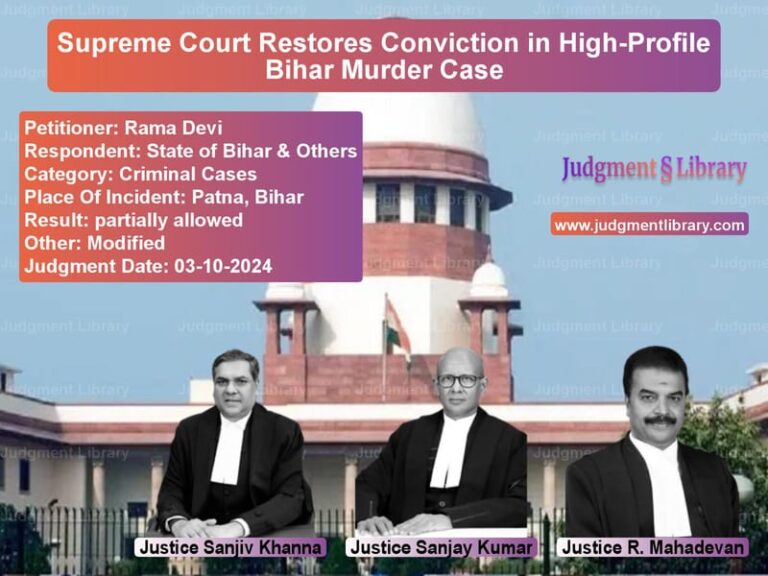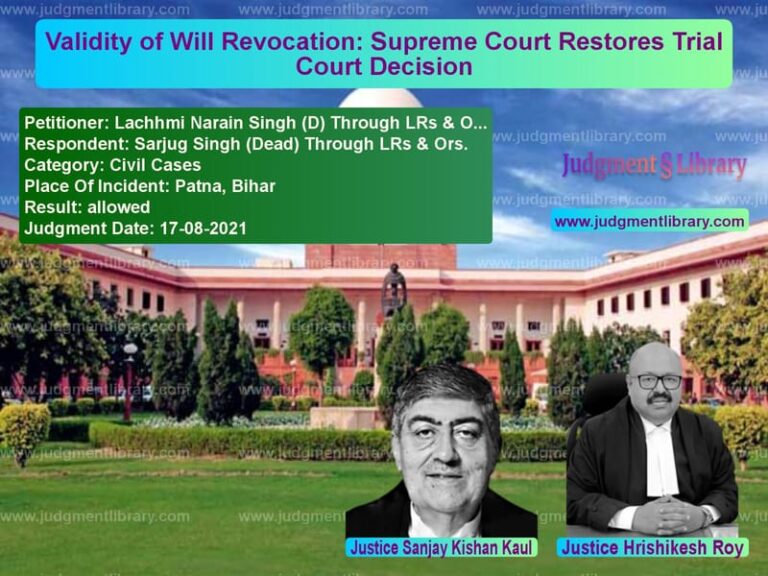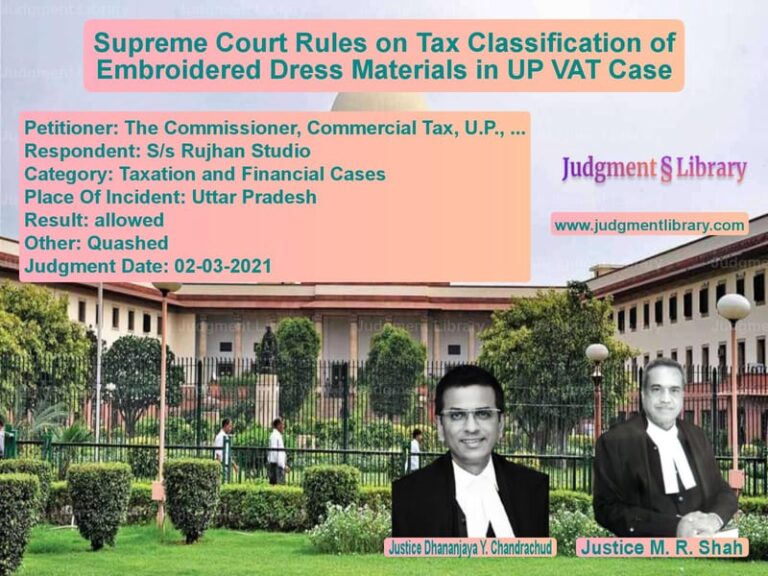Supreme Court Upholds Life Sentence for Unlawful Assembly and Murder in Liquor Shop Dispute
The case of Suresh Dattu Bhojane & Anr. vs. State of Maharashtra is a significant ruling concerning murder, unlawful assembly, and common object under the Indian Penal Code (IPC). The Supreme Court upheld the conviction of the appellants, who were part of an unlawful assembly that resulted in the killing of one person and injuries to two others. The judgment reinforces the principle that mere presence in an unlawful assembly with a common object to commit a crime is sufficient for conviction.
Background of the Case
The case pertains to a fatal attack on Mohan Mungase and his brother Nandkumar Mungase on February 6, 1999, in Maharashtra. The dispute arose over a liquor shop, which had previously been managed by accused A-1, but was later entrusted to the deceased and his brother. This transition led to hostilities between the accused and the victims.
On the day of the incident, the deceased and his companions were sitting at a shop when they were threatened by the accused. Later, when the deceased visited the house of one of the accused, he was attacked by multiple persons armed with swords and other weapons. His brother and a friend who attempted to intervene were also injured.
Petitioner’s Arguments
The appellants, who were convicted under Section 302 (murder) read with Section 149 (unlawful assembly) of the IPC, presented the following arguments:
- They did not actively participate in the assault, and no specific role was assigned to them.
- Their mere presence at the crime scene should not be grounds for conviction under Section 149 IPC.
- The prosecution failed to establish their individual culpability beyond reasonable doubt.
- They had already served over 13 years in jail and should be granted leniency.
Respondent’s Arguments
The State of Maharashtra, defending the conviction, argued:
- The appellants were part of an unlawful assembly that had a clear common object to commit murder.
- The testimony of eyewitnesses, including the injured victim, proved their presence and participation.
- The appellants actively surrounded the deceased, preventing his escape.
- Their conviction under Section 149 IPC was justified as all members of the assembly shared a common intention.
Supreme Court’s Observations
The Supreme Court carefully examined the evidence and legal principles related to unlawful assembly and common object under Section 149 IPC. The Court noted:
“When a group of individuals form an unlawful assembly with a common object, each member of that assembly is liable for the acts committed in furtherance of that object, irrespective of their individual role.”
The Court cited past precedents, including Yunis alias Kariya vs. State of Madhya Pradesh, which held that once common object is established, each member is equally guilty.
Regarding the argument that the appellants did not actively participate in the attack, the Court observed:
“The appellants’ presence at the scene, combined with their prior threats and actions, indicates that they were part of the unlawful assembly with a common object to commit the crime.”
Final Verdict
The Supreme Court upheld the conviction, ruling:
“The appellants were rightly convicted under Section 302 read with Section 149 IPC. Their presence and participation in the unlawful assembly with a clear common object justify their conviction.”
However, the Court noted that since the appellants had already served over 13 years in prison, they were entitled to seek remission as per the state’s policy.
Implications of the Judgment
This ruling has far-reaching implications for cases involving unlawful assembly and common object:
- Collective Responsibility: Once a common object is established, all members of an unlawful assembly can be held equally liable.
- Burden of Proof: Mere presence in an assembly is not enough; the prosecution must prove the common object.
- Remission Possibilities: Long-serving convicts can apply for remission, but their conviction remains intact.
Conclusion
The Supreme Court’s decision in this case reaffirms the principles of collective responsibility under Section 149 IPC. It emphasizes that individuals who join an unlawful assembly must bear the consequences of the actions taken by the group. The ruling serves as a cautionary precedent for those involved in group crimes, reinforcing the legal doctrine that intent and participation in a criminal act determine culpability.
Petitioner Name: Suresh Dattu Bhojane & Anr..Respondent Name: State of Maharashtra.Judgment By: Justice Abhay S. Oka, Justice Pankaj Mithal.Place Of Incident: Maharashtra.Judgment Date: 08-07-2024.
Don’t miss out on the full details! Download the complete judgment in PDF format below and gain valuable insights instantly!
Download Judgment: suresh-dattu-bhojane-vs-state-of-maharashtra-supreme-court-of-india-judgment-dated-08-07-2024.pdf
Directly Download Judgment: Directly download this Judgment
See all petitions in Murder Cases
See all petitions in Attempt to Murder Cases
See all petitions in Bail and Anticipatory Bail
See all petitions in Custodial Deaths and Police Misconduct
See all petitions in Extortion and Blackmail
See all petitions in Judgment by Abhay S. Oka
See all petitions in Judgment by Pankaj Mithal
See all petitions in dismissed
See all petitions in supreme court of India judgments July 2024
See all petitions in 2024 judgments
See all posts in Criminal Cases Category
See all allowed petitions in Criminal Cases Category
See all Dismissed petitions in Criminal Cases Category
See all partially allowed petitions in Criminal Cases Category







